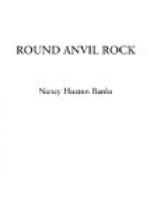“Poetry!” she said. “Is it something that you have written?”
He smiled. “I have merely copied it. I saw the poem for the first time an hour or so ago at Mr. Audubon’s. It is new and has never been printed. It was written by the young English poet, John Keats, to his brother George Keats, who is a partner of Mr. Audubon in the mill on the river. Mr. Keats and his wife are here now, the guests of Mr. Audubon. The poem came in a letter which has just been received. I have copied a part of it, and a few words from the letter, also. Mr. George Keats was kind enough to allow me, and I thought you would like to see them. I hadn’t time to copy the entire poem, though it isn’t very long.”
“It was very kind,” said Ruth. “I am so glad to see it. May I read it now? This is what the letter says,” reading it aloud, so that David also might hear. “If I had a prayer to make for any great good ... it should be that one of your children should be the first American poet?”
“The first English hand across the sea!” said Paul Colbert.
Ruth read on from this letter of John Keats to his brother: “I have a mind to make a prophecy. They say that prophecies work out their own fulfilment.” And then she read as much of “A Prophecy” as the doctor had copied.
* * * * *
“Though, the rushes that will make
Its cradle are by the lake—
Though the linen that will be
Its swathe is on the cotton tree—
Though the woollen that will keep
It warm is on the silly sheep—
Listen, starlight, listen, listen,
Glisten, glisten, glisten, glisten,
And hear my lullaby!
Child, I see thee! Child, I’ve
found thee!
Midst the quiet all around thee!
Child, I see thee! Child, I spy thee!
And thy mother sweet is nigh thee.
Child, I know thee! Child no more,
But a poet ever-more!
See, see, the lyre, the lyre!
In a flame of fire
Upon the little cradle’s top
Flaring, flaring, flaring,
Past the eyesight’s bearing.
Wake it from its sleep,
And see if it can keep
Its eyes upon the blaze—
Amaze, amaze!
It stares, it stares, it stares,
It dares what none dares!
It lifts its little hand into the flame
Unharmed and on the strings
Paddles a little tune and sings,
With dumb endeavor sweetly—
Bard thou art completely;
Little
child,
O’ the western wild....”
Ruth looked at Paul with shining eyes. “I thank you again for thinking that I would like this,” she said.
“A little chap whom I saw last night made me feel like making a prophecy that he would be the first Kentucky astronomer,” said Paul, with a smile. “He was hardly more than a baby, not much over two years old—a toddling curly-head. Yet there he stood by the roadside, looking up at the heavens, as solemn as you please. And he said that ’man couldn’t make moons.’ I didn’t hear him say this, but his brother repeated what he said.”




